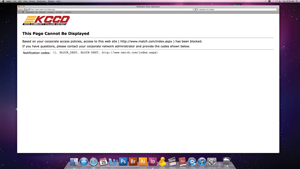If you think that the Bakersfield College network is censoring Web sites, you are mostly wrong.
According to Todd Coston, the recently confirmed Director of Information Technology, when a student encounters the KCCD-branded “This Page Cannot Be Displayed” page, it was because the Web site was automatically blocked by a piece of technology called the Cisco IronPort.
“We don’t really do site blocking,” Coston said. “We have a device that scans for malware, but rarely does that impact students. It’s like anti-virus.”
The IronPort is a device that uses a reputation list of Web sites and periodically checks sites for malware or viruses and then adds them temporarily to a blocked list. The process takes place automatically without any input from the IT staff at the company or organization using the device.
In fact, the only computers at BC that are specifically blocked from accessing certain Web sites are a set of machines on the second floor of the library that are dedicated to looking up books in various databases.
Coston has stated that BC does not do any monitoring of students, but did note that they had the ability and could use it in the event of legal action.
“We get notices from the RIAA and the MPAA,” he said.
Such notices are sent to KCCD offices downtown and his staff has to track them down.
“The MPAA and RIAA are monitoring. We have a responsibility to educate our students. We become liable for not doing anything about it.”
The RIAA is the Recording Industry Association of America and the MPAA is the Motion Picture Association of America. Both groups have been in the news for their efforts to sue large numbers of people who are downloading movies or music illegally as well as pass legislation such as the Stop Online Piracy Act that is currently under consideration.
SOPA would make any use of copyrighted material online a felony.
In fact, in order to meet the legal requirements of the Higher Education Opportunities Act, the IT department has set up a new system to log wireless users who connect to the KCCD portal and who download content illegally or commit other crimes.
“If we have a legal situation, we have to [investigate],” Coston said. “If there was a threat, we would go look into it.”
That being said, Coston sees end-user education as the biggest challenge and warns students to never give anyone their password or login information, even if they appear to be a KCCD employee or have sent an email from a KCCD or BC email address.
For the purposes of this article, the Rip staff noted that Web sites like the Pirate Bay, a file-sharing site, was not blocked from the KCCD network, but the popular dating Web site Match.com was.


